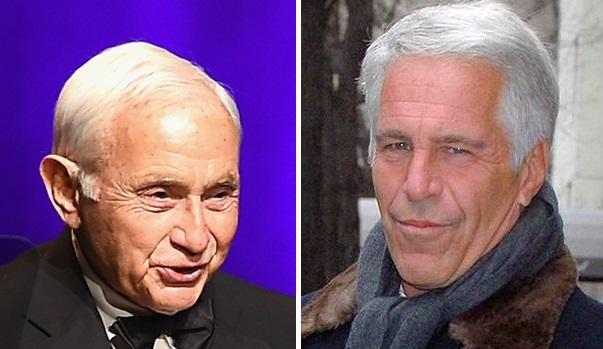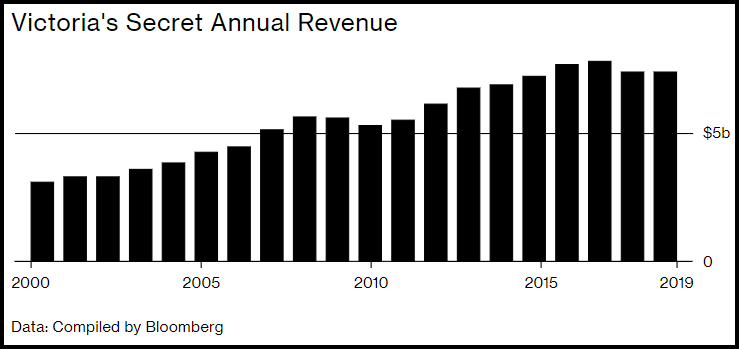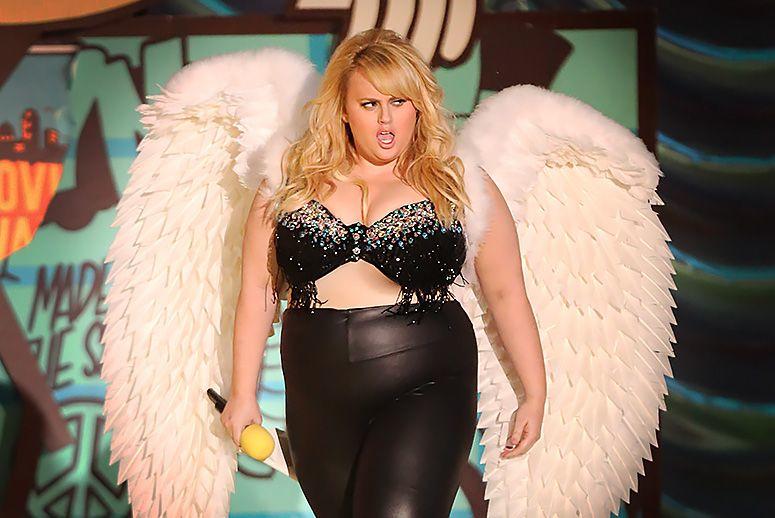 By Tyler Durden: Victoria's Secret has more than just a Jeffrey Epstein problem. The four-decade-old lingerie retailer faces pressure to market to an 'increasingly broadened' definition of beauty - including 'rubenesque' women and transgender individuals who just want to feel sexy.
By Tyler Durden: Victoria's Secret has more than just a Jeffrey Epstein problem. The four-decade-old lingerie retailer faces pressure to market to an 'increasingly broadened' definition of beauty - including 'rubenesque' women and transgender individuals who just want to feel sexy. The company is currently doing Jeffrey Epstein damage control - after Epstein's two-decade-long reign as a "close confidant, financial manager, and right hand" to the CEO of Victoria's Secret parent company - L Brands' Leslie Wexner, according to Bloomberg. And while he wasn't an employee of Victoria's Secret, Epstein had a major impact on the lingerie company over the years.
Epstein also influenced the way the lingerie company operated, associating with the division’s chief marketing officer, Ed Razek. In 2005, for example, Razek was a guest at Epstein’s Manhattan mansion, welcomed by young women who said they were working as models for Epstein. Razek told fellow guest William Mook, head of Mok Industries LLC in Columbus, Ohio, that Victoria’s Secret used Epstein models and that his girls were in “the major league,” according to Mook. -BloombergWexner and Epstein's relationship officially ended in 2007, around 18 months after the financier was charged with several counts of sexual misconduct in Florida - to which he pleaded guilty to just one charge and spent 13 months jail with work release privileges (during which he is alleged to have continued to sexually abuse girls) in a sweetheart deal. Epstein was arrested in July on charges of sex trafficking minors, putting a fresh spotlight with the financier's relationship to Victoria's Secret and Wexner.
What's more, L Brands may not have had such a clean break from the convicted pedophile and his network.
Epstein at one point had a $1 million investment in MC2 Model Management, according to a sworn deposition by a former company bookkeeper. MC2 is owned by Jean-Luc Brunel, a Frenchman who is alleged in a civil lawsuit to have brought girls as young as age 12 to the U.S. for sexual purposes and provided them to his friends including Epstein. Brunel even visited Epstein when he was first imprisoned in 2008. Victoria’s Secret continued to work with MC2-represented models after Wexner severed ties with Epstein. At least three MC2 models walked in Victoria’s Secret’s 2015 fashion show, and the agency’s models were at auditions in 2017 and 2018. They’ve also posed for its catalogs and website. In a 2014 letter to Brunel, his business partner, MC2 President Jeff Fuller, cited worries by Saks, Nordstrom, Macy’s, and other clients about Brunel’s friendship with Epstein. There was no mention of concern on the part of Victoria’s Secret. -Bloomberg#MeToo
Looking forward, Victoria's Secret "is increasingly at odds with society’s changing definition of beauty and the #MeToo movement, both of which are sparking a very different vision of how to portray women and their bodies," according to the report - which notes that Wexner's lingerie empire has shed $20 billion in market value since 2015.

Can a male-dominated company that presents women as lingerie-clad "angels" successfully market to millennials and younger generations conditioned to shun any hint of misogyny, fat-shaming, mansplaining, gender assumption and patriarchal oppression?
Founded in 1977 by Roy Raymond and bought five years later by Wexner for $1 million, the brand sold directly to women looking for push-up bras and sexy panties. As time went on, the brand became fused to a very specific notion of 'sexiness' - i.e. smoking hot, pouty-faced young women with tight, athletic bodies.
As the brand grew, it still provided plenty of eye candy for men—especially through its glittery annual fashion show, which became a marketing coup and a much-anticipated event for the men who flocked to view it. The first was staged in New York’s Plaza Hotel in 1995 (the same year then-real estate developer Donald Trump was forced to sell the legendary hostelry to avoid bankruptcy) and included model Stephanie Seymour gliding down the catwalk. Models wore white and black bras and underwear, but not the large white angel wings that the models in subsequent shows would make famous. Over the years the extravaganza grew with more lights and pop stars. Supermodels such as Gisele Bündchen and Tyra Banks graced the stage. As such, it cast a sex-infused spotlight on a product that our grandmothers viewed as utilitarian and likely purchased from the old Sears catalog. -BloombergWith companies such as Abercrombie dropping its highly sexualized marketing - which had fallen out of favor with shoppers - can Victoria's Secret market to a #MeToo world full of "sexy at any size" women and transgender individuals? Will they?
Victoria’s Secret hasn’t strayed much from its uniformly tall and thin angels. Last November, Razek told Vogue magazine that, after consideration, he’d decided not to use transgender models in his fashion shows. “Well, why not? Because the show is a fantasy,” Razek said, sparking some outraged celebrities and customers to call for his resignation.As a result, L Brands has shut down dozens of underperforming locations - announcing in February the closure of 53 Victoria's Secret locations in North America, over 3x its average.
The failure to embrace changing norms about women and beauty may already be having an impact on Victoria’s Secret’s finances. Sales, which had been on a steady rise since 2010, fell to $7.4 billion in fiscal 2017—the first drop in seven years—and edged slightly lower again last year. Sales at stores open for more than 12 months, a closely watched measure in retailing, also slipped in 2018, with operating income at the unit tumbling 45%, to $512.4 million. -Bloomberg
"Given the decline in performance at Victoria’s Secret, we have substantially pulled back on capital investment in that business," said L Brands executives during a May earnings call.
"Although results were consistent with our guidance, we are clearly not satisfied and are working hard to improve performance."
Earlier this year, Wexner told employees that he was taking a “fresh look” at everything, including brand positioning, marketing, and real estate, in an effort to recharge the business. One notable change: In May, Victoria’s Secret pulled its fashion show from network television after 23 years. Ratings bottomed out in 2018, with only 3.3 million viewers, down from the previous all-time low of 5 million the year prior. In a memo Wexner sent employees about “re-birthing” Victoria’s Secret, he said network TV is no longer the right fit for its signature fashion show, which is expected to move to streaming. -BloombergCan Victoria's Secret forge a sexy path forward without alienating shoppers attuned to 'body-inclusive' messaging?

No comments:
Post a Comment